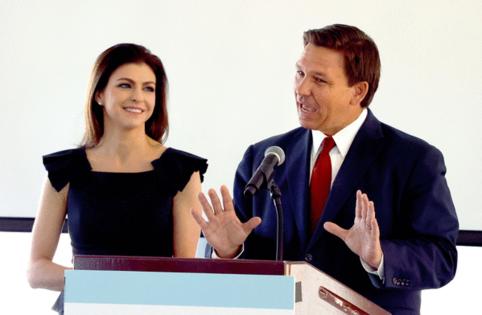Casey DeSantis' Hope Florida charity not complying with state laws, Florida House analysis says
Published in News & Features
TALLAHASSEE, Fla. — One of Gov. Ron DeSantis’ key programs reshaping how the state handles welfare for Floridians has not been complying with state laws governing its oversight, ethics and fundraising, according to an analysis for a Republican-led House committee.
The charity arm of Hope Florida, launched by first lady Casey DeSantis, hasn’t told state lawmakers or auditors about its activities or structure as required in state statutes.
It also appears not to have filed its federal tax returns.
The revelations, noted in a House bill analysis and previewed by the Tampa Bay Times/Miami Herald last week, are oversights for one of the DeSantises’ top priorities this session — and one that’s supposed to be a launchpad for Casey DeSantis if she runs for governor in 2026.
Hope Florida is the couple’s conservative answer to welfare, intended to get Floridians off government aid by directing them to faith-based and other charity organizations.
Since its creation in 2021, the program has involved more than half a dozen state agencies, and DeSantis wants lawmakers to pass a bill this session enshrining it into law. A separate charity, Hope Florida Foundation, collects money from businesses and has disbursed at least $375,000 to local churches since 2023.
But details surrounding the program’s performance, personnel and its foundation have been vague. Requests for public records about the organization made by the Times/Herald have not been returned. Unlike other charities, the foundation’s tax returns are not available online.
The House committee analysis of a bill that would enshrine Hope Florida as an entity in the governor’s office was scathing.
The Hope Florida Foundation is operating as a “direct support organization” under state law, but apparently not complying with any of the provisions of that law, the House analysis notes.
Under the law, the foundation must describe its mission, its three-year plan, its code of ethics, its tax returns and other records on its website and in memos to House and Senate leaders.
None of that information is online or was sent to the Legislature, the House bill notes.
Another state law requires the foundation to conduct annual audits and give them to the state auditor general. The foundation has not done that, according to the House analysis.
When asked by a Times/Herald reporter Tuesday why the foundation had not filed its tax returns, Ron DeSantis lashed out.
“We’re not going to let you try to smear a good program with this stuff on these things,” he said, accusing House Republicans of “feeding you guys stuff.”
“It’s a charitable arm,” he added. “They’re going to take care of the paperwork. But while you’re worried about filing paperwork, we’re worried about lifting Floridians up.”
So far, Hope Florida has been operating under the governor’s authority. A Senate committee is scheduled to hear a bill cementing Hope Florida in law on Tuesday afternoon. A House committee Tuesday unanimously advanced it, although one lawmaker noted the analysis.
“There’s been a lot of politics about Hope Florida over that past four years,” state Rep. Anna Eskamani, an Orlando Democrat, said. “A lot of concerns that pertains to oversight and accountability and just question marks around where the money comes from, how it’s being spent. And I do think those are very concerning questions.”
Making the program permanent would give Casey DeSantis a legislative victory to tout this summer in a crowded Republican primary. It could also assuage concerns about her lack of experience.
The House analysis also raised questions about the state resources being used for the program. Hope Florida says it has 125 “hope navigators” across state agencies, but it was “unknown” how many work in which agencies, the author noted. The navigators are supposed to steer Floridians through state resources and toward local charities.
The analysis also noted that the Department of Children and Families at one point “repurposed existing full-time positions established for other (legislatively directed) department functions” for the Hope Florida program. The Times/Herald found that the Department of Juvenile Justice’s ombudsman was working as a hope navigator.
It was also not known which state agencies have signed contracts for goods or services with Hope Florida.
Doug White, a longtime nonprofit adviser and former director of Columbia University’s fundraising management program, said information on charities should be easily accessible, particularly when it’s affiliated with government entities.
“From my perspective, if a charity is not going to be aggressively transparent, there’s something wrong with it,” White said.
_____
©2025 Tampa Bay Times. Visit tampabay.com. Distributed by Tribune Content Agency, LLC.







Comments